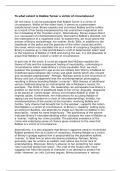Exam (elaborations)
AQA A-level English Literature: 'Atonement': To what extent is Robbie Turner a victim of circumstance?
- Module
- Elements of Crime Writing
- Institution
- AQA
I scored an A* on this essay. I thought it may come up on the 2024 paper 2.
[Show more]



